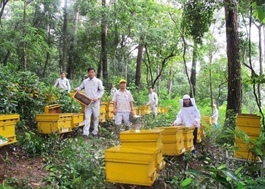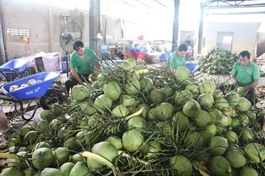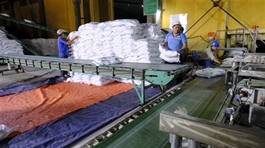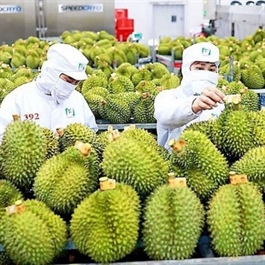Fresh coconuts approved for export to China
Fresh coconuts approved for export to China
Vietnamese fresh coconuts have been approved for official export to China, giving localities, businesses, and coconut farmers hope for a bright future in the coconut industry.

Earlier in August, protocols were signed for fresh coconuts, frozen durian, and crocodiles to be officially exported to China.
The Plant Protection Department under the Ministry of Agriculture and Rural Development (MARD), assessed that fresh coconut exports will bring economic benefits and create momentum for Vietnam's coconut industry to develop sustainably and improve product quality to meet international standards.
Vietnamese localities and businesses are excited as the market of 1.4 billion people opens up.
According to thoibaotaichinh.vn, Tran Van Duc, chairman of Ben Tre Coconut Investment JSC, said, “China's current demand for coconut imports is very large. Vietnam currently ranks seventh in coconut production worldwide. Our advantage is proximity to China, so if this market opens up, coconut exports will see a breakthrough.”
Dang Huynh Uc My, chairwoman of BenTre Import Export JSC stated,"With abundant supply, when Vietnamese coconuts are exported to China, the product will have the opportunity to surpass the $1 billion mark, contributing to increasing income for people and promoting more professional and standardised domestic coconut production."
If businesses exploit their advantages well, the coconut industry can earn an additional $300 million from the Chinese market, said Dang Phuc Nguyen, general secretary of the Vietnam Fruit and Vegetable Association. "In a few years, Vietnam's coconut industry may catch up with Thailand. Moreover, official exports can push the prices of fresh and dry coconuts in our country's growing regions to higher and more stable levels," Nguyen said.
While opportunities and potential are evident, the fresh coconut industry currently faces numerous challenges.
Nguyen Quoc Manh, deputy director of the Department of Crop Production under the MARD, emphasised that the area of linked coconut cultivation remains quite low due to small-scale and fragmented planting.
"Most coconut areas in Vietnam are cultivated by individual households, making it difficult to organise linkages as each household has different cultivation and harvesting processes," Manh said.
Additionally, the industry lacks effective cooperatives or linkage models. Infrastructure and supporting technologies are not advanced. These shortcomings hinder the collection, processing, and transportation of coconuts, as well as the development and expansion of coconut cultivation areas.
To overcome these issues and capitalise on the opportunity of the Chinese market opening, Manh suggested that businesses and localities should immediately invest in deep processing, brand building, strengthening cooperation, and applying new technologies. These steps will help increase the value of processed coconut products and create a solid foundation for the sustainable development of Vietnam's coconut industry.
The MARD will continue to work closely with Chinese authorities to ensure smooth implementation while supporting Vietnamese businesses and farmers in maximising opportunities from these protocols.
The Vietnam Coconut Association forecasts that the export turnover of coconut products this year will reach $1 billion. Despite challenges, with efforts to invest in production development, the coconut industry should not find it difficult to achieve this figure. The potential strengths of coconut trees will be further promoted as the official export market for this industrial crop continues to expand.




























